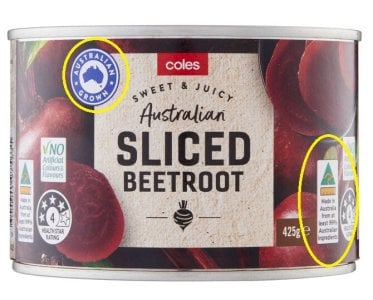Supermarket giant shares massive change in their product catalogue soon
By
Danielle F.
- Replies 25
Navigating supermarket aisles can sometimes feel like a maze.
With every shopper's turn comes an overwhelming array of choices and prices that fit every budget.
In a recent announcement, shoppers of a supermarket giant may see a significant change in their shopping experience soon.
Supermarket giant Coles announced that it will reduce the number of products on its shelves for an easier shopping experience.
Coles' strategy, also called the 'double-digit rationalisation', aimed to eliminate redundant item options.
This new strategy could also introduce a more curated selection of goods.
Coles' Chief Operations and Sustainability Officer Anna Croft highlighted that the initiative was a response to customer feedback.

'We have 13 basic table salts. We don't need those. We might go to five, and we might add three different types of salt in to give customers more choice,' Ms Croft stated.
'Take one of our leading haircare brands—we have six different pack sizes ranging from 80 ml to 1.1 litres. Now that drives huge complexity.'
'Customers tell us when we've got too much range and lots of duplication,' Ms Croft added.
With the double-digit rationalisation underway, Coles stores could remove duplicate items while providing more options for shoppers.
The supermarket's move came after a period of increased product range, partly due to the COVID-19 pandemic.
Supermarkets stocked up on more items to cope with global shortages.
As Australia has already adjusted to a new normal, Coles took the opportunity to refine its inventory.
But what does this mean for shoppers?
This could be a win-win situation, according to QUT's consumer behaviour professor Gary Mortimer.
'Once you give customers multiple product choices, they often become overwhelmed and often make poor choices," he said in an interview.
'When you reduce your range, it lowers supermarket costs and lowers prices.'
Through minimising deals with numerous suppliers and several contractual obligations, supermarkets could operate more efficiently and provide savings for consumers.
However, this change could be a reflection of Coles' recent predicament.
The supermarket duopoly—comprised of Coles and Woolworths—has been on the Australian Competition and Consumer Commission (ACCC)'s radar for its pricing practices.
The ACCC took Coles and Woolworths to court over allegations of misleading discount promotions, which raised questions about their pricing strategies.
In light of these investigations, Coles emphasised its commitment to compliance with Australian Consumer Law.
The supermarket has conducted several 'listening sessions' with customers and has worked closely with suppliers to tailor-fit its product range to their consumers' needs.
As Coles simplifies their offerings, it's clear that the shopping landscape could change soon.
With fewer choices on the shelves, shopping trips may be quicker and less stressful.

Will this new change affect your shopping experience? Share your thoughts about this change in the comments section below!
With every shopper's turn comes an overwhelming array of choices and prices that fit every budget.
In a recent announcement, shoppers of a supermarket giant may see a significant change in their shopping experience soon.
Supermarket giant Coles announced that it will reduce the number of products on its shelves for an easier shopping experience.
Coles' strategy, also called the 'double-digit rationalisation', aimed to eliminate redundant item options.
This new strategy could also introduce a more curated selection of goods.
Coles' Chief Operations and Sustainability Officer Anna Croft highlighted that the initiative was a response to customer feedback.

Coles' product downsizing may benefit shoppers who easily get overwhelmed with multiple choices. Image Credit: Pexels/Anna SHVETS
'We have 13 basic table salts. We don't need those. We might go to five, and we might add three different types of salt in to give customers more choice,' Ms Croft stated.
'Take one of our leading haircare brands—we have six different pack sizes ranging from 80 ml to 1.1 litres. Now that drives huge complexity.'
'Customers tell us when we've got too much range and lots of duplication,' Ms Croft added.
With the double-digit rationalisation underway, Coles stores could remove duplicate items while providing more options for shoppers.
The supermarket's move came after a period of increased product range, partly due to the COVID-19 pandemic.
Supermarkets stocked up on more items to cope with global shortages.
As Australia has already adjusted to a new normal, Coles took the opportunity to refine its inventory.
But what does this mean for shoppers?
This could be a win-win situation, according to QUT's consumer behaviour professor Gary Mortimer.
'Once you give customers multiple product choices, they often become overwhelmed and often make poor choices," he said in an interview.
'When you reduce your range, it lowers supermarket costs and lowers prices.'
Through minimising deals with numerous suppliers and several contractual obligations, supermarkets could operate more efficiently and provide savings for consumers.
However, this change could be a reflection of Coles' recent predicament.
The supermarket duopoly—comprised of Coles and Woolworths—has been on the Australian Competition and Consumer Commission (ACCC)'s radar for its pricing practices.
The ACCC took Coles and Woolworths to court over allegations of misleading discount promotions, which raised questions about their pricing strategies.
In light of these investigations, Coles emphasised its commitment to compliance with Australian Consumer Law.
The supermarket has conducted several 'listening sessions' with customers and has worked closely with suppliers to tailor-fit its product range to their consumers' needs.
As Coles simplifies their offerings, it's clear that the shopping landscape could change soon.
With fewer choices on the shelves, shopping trips may be quicker and less stressful.
Key Takeaways
- Coles planned to reduce the number of products available in stores to simplify everyone's shopping experience.
- The 'double-digit rationalisation' should remove duplicate products, all while providing more choices.
- Coles highlighted the importance of this strategy in responding to customer feedback regarding excessive product range.
- The reduction in products may lead to lower retail prices, potentially benefiting consumers with simpler choices and better deals.








